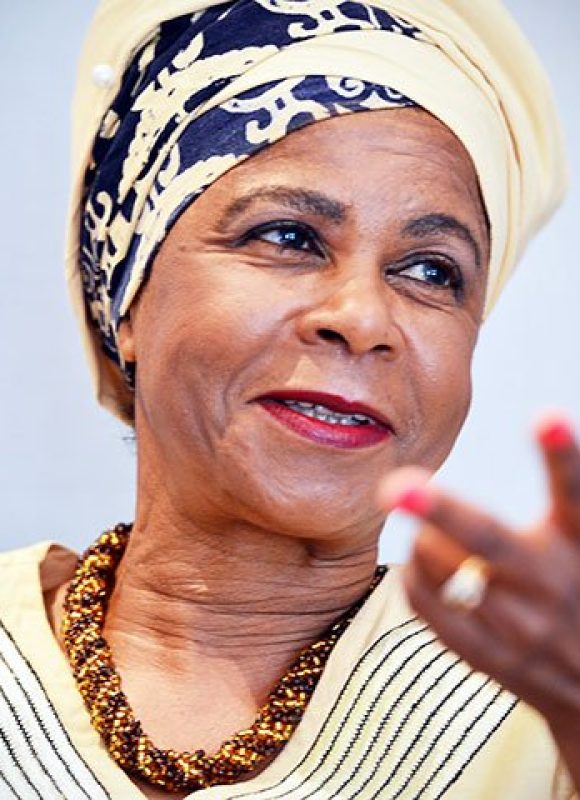PIONEER
Mamphela Ramphele

Politician | Anti-Apartheid Activist | Business Leader
Born: 28 December 1947
“Overcoming authoritarianism starts with recognising it. The attitude that those in authority are to be respected to the point of not daring to question their behaviour, even when it involves wrongdoing, needs to be changed. Educating for democracy is an essential part of that change, as well as realising that the mindsets of both leaders and those who are being led need to be transformed.”
Who is
Mamphela Ramphele?
An anti-apartheid activist, doctor, scholar, politician, and businesswoman.
Professions
and Roles
Medical doctor, student activist, political leader, scholar, businesswoman, vice chancellor of the University of Cape Town (UCT), and author.
Best Known For
Her anti-apartheid activism under apartheid as well as her expansive career as a doctor, scholar, businesswoman, vice chancellor of UCT, and leadership of the political party Agang South Africa.
Life highlights
- Ramphele was accepted to study medicine at the University of Natal in 1968, and qualified as a doctor in 1972.
- She worked with the South African Students’ Organisation (SASO), after its formation in 1969, alongside colleagues including Steve Biko.
- She founded the Zanempilo Community Health Centre in Zinyoka in 1975, and managed the Black Community Health Programme in the Eastern Cape, in addition to a host of other political and public health activities.
- Ramphele became the director of the Black Community Programmes (BCP) in the Eastern Cape when Biko was banned.
- In 1976, she was detained without trial under the Terrorism Act for four and a half months. In 1977, she was banned and banished to Tzaneen, Northern Transvaal (now Limpopo) where she continued her medical work despite constant scrutiny from the apartheid police, forming initiatives like the Isutheng Community Health Programme with funds from the BCP.
- Ramphele completed a commerce degree via Unisa [University of South Africa] between 1975 and 1983, as well as a Postgraduate Diploma in Tropical Medicine and a Diploma in Public Health at the University of the Witwatersrand. She was appointed as a research fellow at the South African Development Research Unit at UCT.
- Ramphele spent a year at Harvard College as the Carnegie Distinguished International Fellow from 1988 to 1989, and completed a PhD researching the realities of living in hostels.
- She was appointed deputy vice chancellor of UCT in 1991 and, in 1996, was the first black South African woman to become vice chancellor of UCT.
- In 2000, she joined the World Bank and has, since then, served as chairman or board member of a variety of trusts, institutes, corporations, and charities.
- She founded Agang South Africa in 2013, and retired from party politics in 2014.
“Overcoming authoritarianism starts with recognising it. The attitude that those in authority are to be respected to the point of not daring to question their behaviour, even when it involves wrongdoing, needs to be changed. Educating for democracy is an essential part of that change, as well as realising that the mindsets of both leaders and those who are being led need to be transformed.”
– Mamphela Ramphele, 2012
IN THE WORDS OF OTHERS
“Dr Mamphela Ramphele is a South African of exceptional talent, ability, and stature. With such a person at its helm, the University of Cape Town can face the future with confidence. The nation can rest assured that one of its foremost institutions of higher learning will continue to prosper and serve with excellence as we enter the new century.
However, we would not want to hide the special satisfaction caused by the fact that the new vice chancellor at our premier university is a woman and black. South Africans tonight joyously celebrate this affirmation of the quality of our diversity and the strength of our unity.
Transformation … includes making the most of the limited opportunities available. It can never mean suspending the striving for quality and excellence until ideal conditions are achieved. Dr Ramphele and others like her are powerful role models in this regard. They exemplify struggle against adversity, combined with personal responsibility for self-development.”
– Nelson Mandela, then President of South Africa, 1996
Mandela, N (11 October 1996), ‘Address by President Nelson Mandela at the installation of Dr Mamphela Ramphele as Vice Chancellor of the University of Cape Town’,
http://www.mandela.gov.za/mandela_speeches/1996/961011_ramphele.htm
https://berkleycenter.georgetown.edu/interviews/a-discussion-with-dr-mamphela-ramphele
https://www.britannica.com/biography/Mamphela-Ramphele
https://www.nelsonmandela.org/content/page/dr-mamphela-ramphele
https://www.sahistory.org.za/people/dr-mamphela-aletta-ramphele
